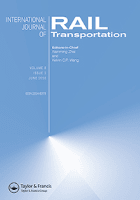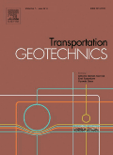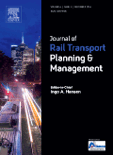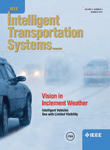
International Journal of Rail Transportation
Scope & Guideline
Elevating standards in automotive and rail mechanics.
Introduction
Aims and Scopes
- Railway Engineering and Infrastructure:
The journal emphasizes research on the design, construction, and maintenance of railway infrastructure, including tracks, bridges, and tunnels. - Train Dynamics and Performance:
It investigates the dynamic behavior of trains and their interactions with tracks, focusing on aspects like vibration, stability, and safety under various operational conditions. - Railway Vehicle Technology:
Research on the design and optimization of railway vehicles, including braking systems, suspension mechanisms, and energy efficiency features, is a core area of focus. - Safety and Reliability in Rail Systems:
The journal addresses issues related to the safety and reliability of rail systems, including risk assessment, failure analysis, and maintenance strategies. - Environmental Impact and Sustainability:
The journal explores the environmental implications of railway operations and technologies, focusing on noise reduction, energy consumption, and sustainable practices. - Data-Driven Approaches and Machine Learning:
Recent publications highlight the integration of machine learning and data analytics in predicting maintenance needs, optimizing operations, and enhancing system reliability.
Trending and Emerging
- Digital Twin and Simulation Technologies:
The rise of digital twins and advanced simulation frameworks for railway systems is enabling real-time monitoring and predictive maintenance, marking a significant trend in the industry. - Machine Learning and AI Applications:
The application of machine learning and artificial intelligence in various railway domains, such as predictive maintenance and operational efficiency, is rapidly gaining prominence. - High-Speed Rail Innovations:
Research focusing on high-speed rail technology, including aerodynamic optimization and structural dynamics, is increasingly relevant as countries expand their high-speed rail networks. - Sustainability and Eco-Friendly Practices:
There is a growing emphasis on sustainability in railway operations, including studies on energy efficiency, noise reduction, and environmentally friendly materials. - Smart Railway Systems:
The integration of smart technologies, such as IoT and advanced sensors, in railway systems to enhance safety, efficiency, and passenger experience is an emerging theme.
Declining or Waning
- Traditional Track Maintenance Methods:
Older methodologies for track maintenance are being overshadowed by innovative, data-driven approaches that leverage technology for predictive maintenance. - Basic Aerodynamic Studies:
Research focusing solely on basic aerodynamic principles without practical applications or advanced modeling techniques has seen a decline as more sophisticated analyses emerge. - Static Load Analysis:
The emphasis on static load analysis in railway structures is waning, with more attention shifting towards dynamic interactions and real-time assessments. - Conventional Train Scheduling Techniques:
Traditional scheduling methods are being replaced by advanced optimization algorithms and machine learning techniques that improve efficiency and adaptability.
Similar Journals

eTransportation
Exploring Cutting-Edge Solutions for Intelligent TransporteTransportation is a premier academic journal published by Elsevier, dedicated to advancing the fields of Automotive Engineering, Electrical and Electronic Engineering, Energy Engineering and Power Technology, and Transportation. Since its inception in 2019, the journal has achieved an outstanding reputation, maintaining a prestigious Q1 ranking across multiple categories in the 2023 Scopus rankings, including a remarkable top position in Automotive Engineering. With an impact factor reflecting its influence and rigorous peer-review process, eTransportation serves as a vital platform for researchers, professionals, and students alike, fostering innovation and disseminating vital research findings that shape the future of transportation technologies. Based in the Netherlands, it supports open access options that enhance the visibility and accessibility of research, ensuring scholarly engagement worldwide. As the field evolves, eTransportation is poised to lead discussions and advancements towards more efficient, sustainable, and intelligent transport solutions.

ITE JOURNAL-INSTITUTE OF TRANSPORTATION ENGINEERS
Empowering Professionals in Transportation EngineeringITE JOURNAL - INSTITUTE OF TRANSPORTATION ENGINEERS is a distinguished publication that serves as a vital resource in the fields of Automotive Engineering and Mechanical Engineering, bridging the gap between research and practical application in transportation systems. Published by the Institute of Transportation Engineers in the United States, this journal has been contributing to the academic discourse since 1978 and continues to be a relevant platform for innovative research and insights. The journal currently holds a Q4 ranking in both Automotive Engineering and Mechanical Engineering categories, reflecting its niche but impactful presence in the Scopus database. Although the journal is not open access, it remains a critical outlet for researchers and professionals looking to advance their knowledge and influence practices in transportation engineering. With its commitment to disseminating quality research, the ITE Journal is a must-read for anyone involved in the transportation sector seeking to stay ahead in this dynamic field.

Transportation Geotechnics
Connecting Soil Science with Transportation Solutions.Transportation Geotechnics is a premier academic journal published by Elsevier, focusing on the intersection of geotechnical engineering and transportation systems. With an impressive impact factor and categorized in the Q1 quartile across multiple disciplines including Civil and Structural Engineering, Geotechnical Engineering, and Transportation, this journal stands as a vital resource for researchers and practitioners alike. It covers a broad spectrum of topics ranging from soil behavior in transport contexts to innovative materials and methods that enhance infrastructure stability and performance. As an essential platform fostering knowledge dissemination, Transportation Geotechnics enables contributors to share their groundbreaking findings while providing readers with access to cutting-edge research and reviews from 2014 to 2024. Its illustrious Scopus rankings place it prominently in the global research landscape, making it an indispensable tool for students, professionals, and academics dedicated to advancing the field.

Journal of Rail Transport Planning & Management
Driving Innovation in Rail Transport ResearchThe Journal of Rail Transport Planning & Management, an esteemed publication by ELSEVIER SCI LTD, focuses on the intricate aspects of rail transport systems, blending insights from civil and structural engineering, management science, and transportation. With an ISSN of 2210-9706 and an E-ISSN of 2210-9714, this journal serves as a critical platform for researchers, professionals, and students to disseminate and engage with high-quality research from 2011 to 2024. Its impressive impact factor, bolstered by its Q1 status in several essential categories—including Civil and Structural Engineering and Management Science and Operations Research—underscores its significance within the academic community. The journal operates in an open-access model, ensuring a wide-reaching dissemination of knowledge, thereby fostering collaboration and innovation in rail transport planning and management. Positioned in the Netherlands and backed by rigorous Scopus rankings, the journal plays a pivotal role in advancing methodologies and practices that shape the future of rail transport infrastructure and operations.

IEEE Intelligent Transportation Systems Magazine
Driving the Future of Intelligent MobilityIEEE Intelligent Transportation Systems Magazine, published by the IEEE-Institute of Electrical and Electronics Engineers Inc., is a leading journal in the fields of automotive engineering, computer science applications, and mechanical engineering. With an impressive impact factor reflected in its 2023 rankings, this journal sits in the top quartile (Q1) across multiple engineering categories, making it an essential resource for researchers and professionals dedicated to advancing the intelligent transportation systems landscape. The magazine covers a diverse array of topics from vehicle technology innovations to traffic management solutions, aimed at improving transportation efficiency, safety, and sustainability. Since its inception in 2009, the publication has established a solid reputation for disseminating cutting-edge research and practical applications in intelligent transportation, all while remaining an accessible resource for academic and industrial stakeholders alike. Subscribe today to stay at the forefront of transformative transportation technologies!

Transportation Safety and Environment
Innovating solutions for sustainable transportation practices.Transportation Safety and Environment is an esteemed open-access journal published by Oxford University Press, dedicated to advancing the field of transportation safety and environmental sustainability. Since its inception in 2019, the journal has rapidly gained recognition with an impressive Q2 category ranking in Control and Systems Engineering, Engineering (miscellaneous), and Safety, Risk, Reliability and Quality as of 2023. With an E-ISSN of 2631-4428, it provides a platform for high-quality research that addresses critical safety challenges and environmental impact within the transportation sector, covering a wide array of topics from vehicle safety measures to ecological considerations in transportation infrastructure. The journal’s open-access model promotes widespread distribution and accessibility of research findings, enabling researchers, professionals, and students to engage with the latest advancements and contribute to future developments in the field. Located in the heart of the United Kingdom at Great Clarendon St, Oxford OX2 6DP, England, Transportation Safety and Environment stands at the forefront of fostering innovative solutions for safer and more sustainable transportation practices worldwide.

Baltic Journal of Road and Bridge Engineering
Connecting Knowledge: Your Gateway to Civil Engineering ExcellenceThe Baltic Journal of Road and Bridge Engineering, published by RIGA TECHNICAL UNIV-RTU, serves as a pivotal platform for disseminating cutting-edge research in the fields of building and construction as well as civil and structural engineering. Established as an Open Access journal since 2006, it fosters global collaboration and accessibility to critical engineering knowledge, facilitating the exchange of innovative ideas among researchers, professionals, and students. With a commendable impact factor and recognition in Scopus rankings, where it stands in the third quartile for both relevant engineering categories, the journal underscores its significance in advancing the discipline. The journal aims to publish high-quality, peer-reviewed articles that address contemporary challenges in road and bridge engineering, making it an essential resource for anyone involved in infrastructure development and research. Located in Lithuania at 6B Kipsalas Street, RIGA LV-1658, this journal not only highlights the latest advancements but also seeks to inspire future innovations in engineering practices.

Transportation Infrastructure Geotechnology
Transforming Transportation through Geotechnical Excellence.Transportation Infrastructure Geotechnology, an esteemed journal published by SpringerNature, serves as a vital platform in the fields of Civil and Structural Engineering, Environmental Engineering, Geotechnical Engineering, and Transportation. Established in 2014 and spanning a decade of significant scientific discourse, this journal has gained recognition for its robust contribution to the understanding of the interplay between geotechnical processes and transportation infrastructure. With an impactful Q2 ranking in multiple categories—including Civil and Structural Engineering and Environmental Engineering—it emphasizes innovative research and practical applications globally. Researchers and professionals can explore critical topics that influence infrastructure sustainability, safety, and efficiency. Although it operates under a subscription model, its affiliation with SpringerNature ensures rigorous peer-review and high-quality publications, making it an indispensable resource for academics and industry experts alike.

Journal of Transportation Engineering Part A-Systems
Exploring the Future of Civil Engineering and Transportation NetworksThe Journal of Transportation Engineering Part A-Systems, published by the American Society of Civil Engineers (ASCE), is a cutting-edge, peer-reviewed journal dedicated to the advancement of knowledge in the field of transportation systems. With an ISSN of 2473-2907 and an E-ISSN of 2473-2893, this journal serves as a crucial resource for researchers, professionals, and students interested in the intricate interplay between civil engineering and transportation networks. Boasting a Q2 ranking in both the Civil and Structural Engineering and Transportation categories, this journal reflects the high-quality research contributing to these vital disciplines. Accessible through open-access options, the journal provides a platform for innovative ideas and research findings from 2017 to 2024, aiming to address contemporary challenges in transportation systems while fostering interdisciplinary collaboration. As an essential outlet for scholarly work in the United States and beyond, the Journal of Transportation Engineering Part A-Systems is committed to enhancing the understanding of complex transportation dynamics and the development of sustainable and efficient infrastructures.

Railway Engineering Science
Bridging Theory and Application in Railway EngineeringRailway Engineering Science is an esteemed open-access journal published by Springer, dedicated to advancing research and innovation in the dynamic field of railway engineering. Since its inception in 2020, the journal has positioned itself at the forefront of numerous engineering disciplines, securing a remarkable Q1 ranking in 2023 across critical categories such as Computational Mechanics, Computer Science Applications, Electrical and Electronic Engineering, Mechanical Engineering, and Transportation. With a strong emphasis on disseminating high-quality research, Railway Engineering Science provides a vital platform for scholars and professionals to share their findings, thereby contributing significantly to the academic community and industry practices. Situated in Singapore and catering to a global audience, the journal facilitates open access, ensuring that groundbreaking studies are readily available to researchers, practitioners, and students alike. The journal not only enhances the visibility of its contributors but also fuels advancements in railway technology and infrastructure, making it an essential resource for anyone involved in the railway sector.